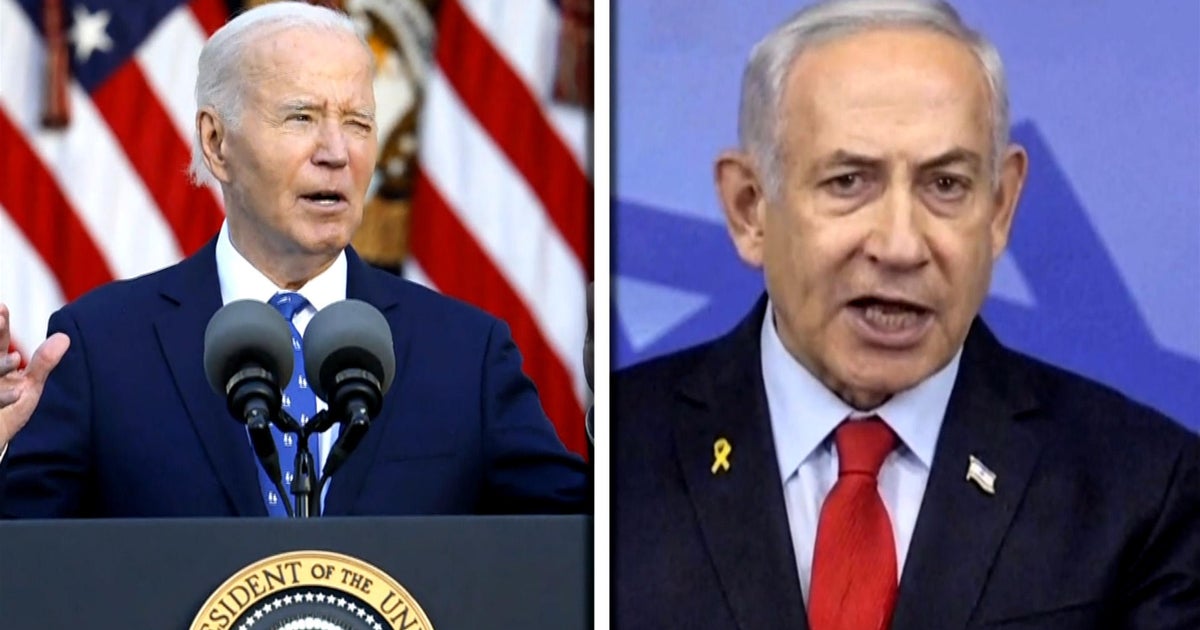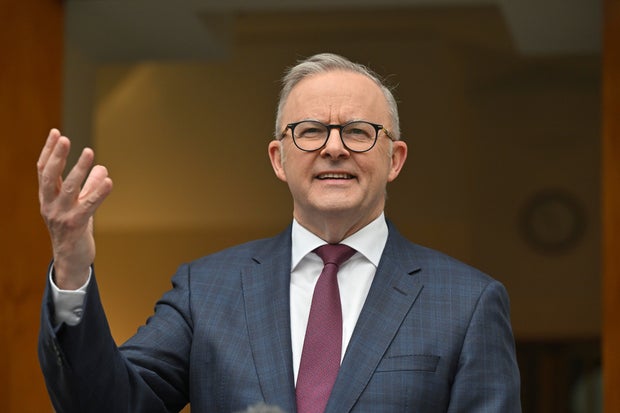CBS News
Muslims observe Ramadan amid tension of Israel-Hamas war

Watch CBS News
Be the first to know
Get browser notifications for breaking news, live events, and exclusive reporting.
CBS News
Will gold prices increase in 2025? Experts weigh in

Getty Images
The price of gold soared to all-time highs this year, hitting a record $2,790 per ounce in October. People have been flocking to the precious metal for protection against inflation and global market swings.
Recently, though, gold prices have pulled back. But many investors still see this as an opportunity. In today’s economic climate, gold’s appeal lies in its role as a reliable store of value that can’t be printed or created at will.
As 2025 approaches, investors are watching gold closely. Economic shifts, political changes and global tensions could all impact its value in the coming months and experts see compelling evidence for different scenarios ahead.
See how much a gold investment could cost you here now.
Will gold prices increase in 2025?
Finance professionals see different possible paths for gold prices next year:
Yes, gold prices could tick back up in the new year
“With economic uncertainty, rising inflation and central banks maintaining interest in gold as a reserve seat, prices are likely to climb,” says Brandon Aversano, founder of The Alloy Market. When markets get shaky, he explains, investors turn to gold as a shield against volatility.
This flight to safety could gain momentum as U.S. policy shifts take shape. David Akrami, author of Gold and Silver Mastery, points to upcoming changes that might impact the dollar. These include new tariffs and pressure for lower interest rates. The stakes could rise even higher as some officials hint at moving away from the dollar as the world’s reserve currency. This would likely push gold prices up.
Adding to these economic factors, global tensions remain a wild card. Depending on what happens abroad, gold prices could spike or fall.
Get invested in gold before the price rises again.
But there’s always a chance it could hold steady or drop
Despite strong arguments for rising prices, gold may see headwinds in 2025. Recent developments on the global stage could cool the precious metal’s hot streak.
The economic picture could also shift against gold. “If central banks tighten up and push stronger monetary policies, we might see the U.S. dollar strengthen,” emphasizes Aversano. This could cause gold to become costly for foreign buyers and, thus, impact its demand. If inflation slows, he adds, “investors might focus [on] chasing higher returns with stocks or bonds.”
Gold investments to consider in 2025
Gold investments can help diversify your portfolio, regardless of where prices head in 2025. Many financial advisors suggest holding some gold as a hedge against inflation and market swings.
Akrami and Henry Yoshida, founder of Rocket Dollar, share three ways to invest in the precious metal next year:
Physical gold
If you want direct ownership, physical gold (e.g., gold bars and gold coins) offers complete control of your investment. While buying and selling comes with higher transaction costs, many investors value holding the actual metal. Some providers have gold IRA options with tax advantages through specialized depository partnerships.
Gold ETFs
Gold exchange-traded funds (ETFs) make it easy to buy and sell the precious metal through any brokerage account. Many are backed by real gold, giving you market exposure without storage hassles. “Preferably, investors should focus on gold-tracking ETFs to ensure pure exposure to the underlying asset,” Yoshida advises. Transaction costs stay low, making ETFs popular for new and experienced investors.
Gold mining stocks
Gold mining stocks come with company-specific risks. Unlike other gold investment options, their value depends on more than gold prices. “Not all mining stocks are the same, and some have better fundamentals than others,” Akrami cautions. Both experts recommend sticking to ETFs or physical gold unless you’re ready to research individual mining companies thoroughly.
The bottom line
Gold’s path in 2025 is uncertain, with global events and economic changes potentially pushing prices in either direction. Despite this, Aversano sees physical gold as a safe investment because its value doesn’t waver much with market changes. But he suggests ETFs as an accessible alternative for some investors depending on their goals.
Before gold investing, talk with a financial advisor about how gold fits your investment plan. They may help you start with a small allocation and choose an investment type that matches your risk appetite.
CBS News
Australia social media ban for under-16s takes a big step closer to becoming law

The lower house of Australia’s parliament passed legislation Wednesday that, if approved as expected, will ban children under the age of 16 from using most social media platforms, bringing the country ever closer to implementing what would be a uniquely strict law governing kids internet habits.
The country’s House of Representatives passed the bill by a sweeping margin, with 102 votes in favor and only 13 against the legislation. It will now move to the Senate where it’s expected to pass during the parliament’s final session of the year on Thursday.
Australia’s major parties in the House all supported the bill, which would see social media companies such as TikTok, Facebook, Snapchat, Reddit, X and Instagram face fines of up to 50 million Australian dollars ($33 million) for failing to prevent people under 16 from creating accounts on their platforms.
Tech giant Meta, which owns Facebook, Instagram and Threads, has called for the bill to be delayed.
In a statement posted online Tuesday, Meta said it was “concerned the government is rushing this legislation without adequate consultation or evidence and there are still many unknowns with respect to its implementation.”
“The Government’s approach will likely require each app provider to collect personal identification or biometric data from all Australians in order to prevent under 16s from accessing their services, an inefficient and burdensome process for everyone,” a Meta spokesperson said.
Meta also pointed to a policy it introduced earlier this year on its Instagram platform, Instagram teen accounts, which limits who can contact teenagers via their accounts and attempts to moderate the content that young users see.
In a post shared last week on the X platform that he owns, tech billionaire Elon Musk also condemned the Australian bill and said it seemed to him “like a backdoor way to control access to the Internet by all Australians.”
Mick Tsikas/AAP Image via AP
Other independent bodies and non-profit organizations have also taken aim at the bill, voicing concern that young people’s human rights could be restricted by it.
The CEO of the Save the Children charity Mat Tinkler said in a statement earlier this month that while he welcomes government efforts to protect children from harm online, the solution should be regulating social media companies, rather than introducing a blanket ban.
“We are asking the government to reconsider this legislative approach and instead use the momentum of this moment to hold the social media giants to account, to demand that they embed safety into their platforms rather than adding it as an afterthought, and to work closely with experts and children and young people themselves to make online spaces safer, as opposed to off-limits,” Tinkler said.
The Australian Human Rights Commission, an independent government body, expressed its own “serious reservations” over the proposed law in an analysis published last week.
“There are less restrictive alternatives available that could achieve the aim of protecting children and young people from online harms, but without having such a significant negative impact on other human rights. One example of an alternative response would be to place a legal duty of care on social media companies,” the analysis said. “We also need to help children and young people to better navigate online spaces by ensuring the national curriculum includes a specific focus on teaching digital literacy and online safety.”
Australian Prime Minister Anthony Albanese rejected criticism of the proposed law as he addressed the parliament Monday.
“There are common sense exemptions. We want to make sure that young people can continue to access health and education related services — Headspace, YouTube, Google Classroom — as well as messaging services and online games,” he said.
The Australian leader added that there would be “very strong and strict privacy requirements to protect people’s personal information, including an obligation to destroy information provided once age has been verified.”
Despite the criticism, the legislation remains popular among Australians, according to recent polling data.
A YouGov survey released Tuesday showed 77% of Australians back the ban on under-16s, and 87% of said they supported the introduction of stronger penalties for social media companies that fail to comply with regulations.
CBS News
Inside 23andMe CEO Anne Wojcicki’s vision for the company: It “will transform health care”

Watch CBS News
Be the first to know
Get browser notifications for breaking news, live events, and exclusive reporting.








